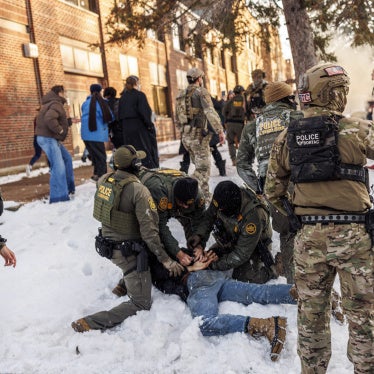The U.S. House of Representatives will likely vote before the end of this week on the U.S.-Dominican Republic-Central America Free Trade Agreement (DR-CAFTA). The House should reject the accord for falling short on workers' human rights because it does not require countries to protect women workers from discrimination or to have laws that meet international labor standards.
Under a regional trade pact known as DR-CAFTA, which passed the U.S. Senate and is likely facing a vote in the House of Representatives by the end of July, the weak labor laws that allow such human rights abuses to flourish could remain intact in U.S. trading partners like El Salvador. Yet the Bush administration is attempting to sell this agreement with Costa Rica, the Dominican Republic, El Salvador, Guatemala, Honduras, and Nicaragua as pro-worker. Congress should not be fooled. The accord falls short on workers’ rights, and Congress should reject it in its current form.
Under existing laws that DR-CAFTA would replace, the United States can withdraw trade benefits from Central American and Caribbean countries if they do not enforce their labor laws and if those laws do not protect workers’ rights. But DR-CAFTA only has one enforceable labor rights requirement: that countries apply their own labor laws—even if they are grossly inadequate. If governments change their laws to eliminate rights, that’s okay, too, just so long as the new laws are enforced.
Equally troubling, DR-CAFTA affords women and other groups that have historically faced abuse in the workplace no protection from discrimination. Women workers predominate in Central American and Dominican free trade zones. This year, the State Department identified sexual harassment and pregnancy-based discrimination as serious problems in the region.
The Bush administration’s spin is that DR-CAFTA’s enforce-your-own-laws standard is sufficient because the labor laws in the region are fine. It claims that International Labor Organization (ILO) studies confirmed its analysis. In fact, these studies found no such thing. Instead, they identified at least twenty-seven areas in which labor laws in the region fall short of international standards, for example, by severely restricting workers’ right to strike.
El Salvador’s labor laws exemplify the weakness of workers’ rights protections in the region. Several months ago, Congressman Kevin Brady (R.-Texas), a DR-CAFTA supporter, cited a Salvadoran law allowing workers to register a union with thirty-five supporters as an example of the region’s allegedly strong labor protections. But an ILO decision says this minimum number, along with El Salvador’s other union registration requirements, are so onerous that they “seriously infringe the principles of freedom of association.”
The Bush administration claims that the real obstacle to greater respect for workers’ rights in the region is weak labor law enforcement. It cites DR-CAFTA’s Labor Cooperation and Capacity Building Mechanism, designed to help governments better protect workers’ rights, as a panacea for this problem. But DR-CAFTA does not require funding for this mechanism.
Recently, the U.S. Trade Representative, Rob Portman, promised to support $40 million a year for labor and environmental capacity building in Central America and the Dominican Republic. But this is a nonbinding pledge and only tells half the story. The other half of the story is the Bush administration’s proposal to cut by 87 percent—from $93.2 million to $12 million—the 2006 budget for the U.S. Department of Labor’s Bureau of International Labor Affairs (ILAB). ILAB is the principal U.S. agency charged with providing international workers’ rights assistance and houses the Office of Trade Agreement Implementation, the national contact point for administering the labor chapters of all free trade agreements to which the United States is party.
Other governments in the region are also withholding resources for labor rights enforcement. According to the Central American and Dominican governments’ white paper, in 2005, only half the countries in the region apparently increased Labor Ministry budgets more than the inflation rate.
Opponents of DR-CAFTA have been called many names, “protectionists” among the most common. But it is not protectionist to join a chorus of opposition from labor and women’s movements, human rights activists and ombudsmen, and Catholic bishops throughout Central America and the Dominican Republic who understand that the region’s workers will be the big losers under DR-CAFTA.
Such losers include the thirty union members fired from a baked goods factory in El Salvador in 2002. With no right to their jobs back under Salvadoran law, they accepted the severance pay due for illegal, anti-union dismissals, knowing that a successful court fight would still leave them out of work.
Rather than playing a game of smoke and mirrors, the Bush administration should renegotiate DR-CAFTA to strengthen workers’ rights protections and provide the funds to make them a reality. For Congress to oppose DR-CAFTA until it does so isn’t protectionist or anti-trade, it’s pro-human rights.
* Carol Pier tracks labor rights and trade for Human Rights Watch.







